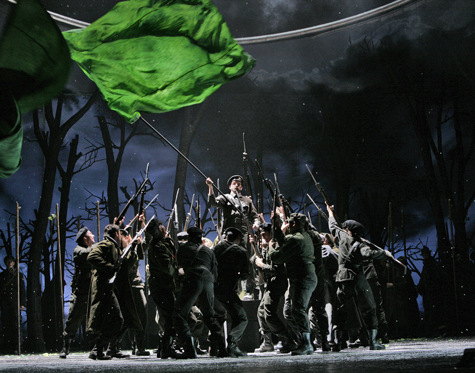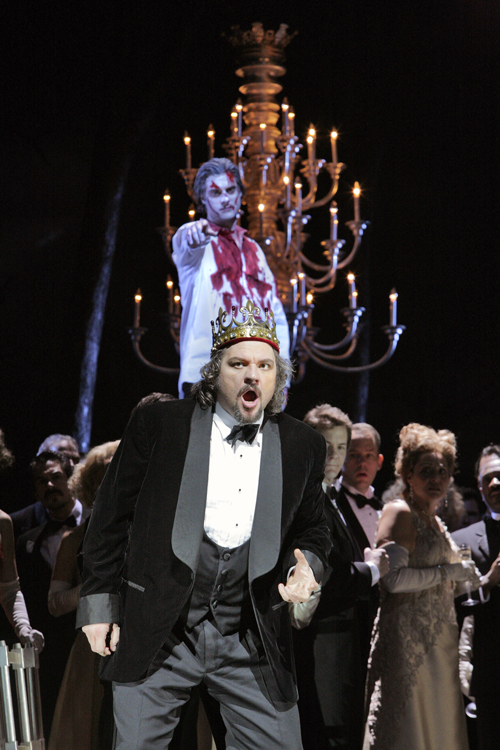(Shakespeare wrote the play, remember,
for James I, a descendant of Banquo’s, a passionate believer in witchcraft
and the author of a book on demonology. There’s no way to know how much of
this credence the author shared.) In the opera, the witches’ off-kilter
polka in the opening scene is peculiar but not exactly sinister; their
whirling waltz in the cauldron scene is not music for a ballroom but does not
stink of black magic. He does much better with the ghostly evocations of
bagpipes (bassoons and oboes) for the apparitions of the kings.
Stage directors tend to share Verdi’s ambivalence (if that’s what it
was), and they have the additional problem of making sense of what modern
audiences no longer take seriously. In a recent production in Istanbul, the
witches were humorless demonic forces motivating all the wicked actions of
the opera – which I think is a mistake. Ludicrous witches, however, were
the great flaw in Adrian Noble’s new production at the Met – an enormous
crowd of bedraggled park bench ladies in ratty housecoats, clunky shoes and
socks, pin-on hats, and handbags wielded like the weapons of Monty Python
drag queens. Are they intended to be funny or eldritch? Though this is a
puzzlement Verdi may have shared, it seemed a desperate attempt to find a
modern equivalent in gooseflesh to Shakespeare’s voices of Fate who vanish
into thin air. (The Met’s witches do not vanish at all; they run
offstage.)
The scenes that tend to stump the average director stumped Noble as well:
Banquo the soldier vet sings his haunted aria to Fleance after acknowledging
the tramps gathered around a steel-drum fire; their casual friendliness then
turns inexplicably to menace. The omission of a forest of cut branches for
ambulatory Birnam Wood is regrettable. The sensuality at the core of the
Macbeth marriage is clear enough from their duets and complete trust in each
other; it isn’t necessary to have every encounter conclude rolling into
bed. The Sleepwalking has been cued by Verdi’s highly original choice to
have the Lady’s snatches of dream uttered while the orchestra plays – but
no one ever sings – the melody; this is undercut when the two witnesses’
interjections of horror come from seated psychiatrists observing the patient
from a therapeutic distance.
Noble’s production achieved most when it tried least hard. The gloomy
forest semicircling the stage area gave an appropriate mood to the tale, and
the sequoia-sized columns that move about to become Duncan’s trapping
bedchamber or an imperial banquet hall (with the splendid addition of
grotesque chandeliers and grotesque choreography) are highly effective uses
of the Met’s enormous stage. The blazing light show (probably only visible
from downstairs) that accompanies the apparitions is a thrill, as are the
mouthing faces in glass bubble monitors.
And the singing, you ask? Well, after October’s underpowered
Lucias (both casts), it was a great pleasure to hear five (yes,
five) Met-sized voices easily filling the cavernous theater. Maria Guleghina
sang a sumptuous “Vieni t’affretta,” filling one with anticipation for
her Norma, but followed it with a cabaletta that was sloppily all over the
place to fill one with alarm at the thought of her as Norma. The coloratura
of the drinking song also lurched, but for this scene it’s appropriate; she
acted the woman who loves being the life of her parties – and seemed
humiliated when the her husband’s hysteria ruined her moment. The murky
suspense of “Le luce langue,” sung on her back on a couch as she idly
daydreams of power, curdled the blood, but the Sleepwalking Scene was a
distraction, delivered full voice as she histrionically clambered over chairs
and played with a rocking ceiling light – perhaps she can deliver this
climactic scene introspectively, with some exposure of character, but as
staged, it went for very little.
 A scene from Act IV of Verdi's "Macbeth."
A scene from Act IV of Verdi's "Macbeth."
To Guleghina’s weird, wet and wild bra-popping Lady, Željko Lučić’s
Macbeth made a contrast and a complement, brooding where she was flamboyant.
This is appropriate: action is taken by Macbeth, but only after long
consideration (and wifely exhortation), the great soliloquies state the point
of the play, of Shakespeare’s essay on the self-destructions of ambition.
Stout and weary in formal clothes already drenched in the sweat of ghostly
visitations at his big party, he sits disconsolate, exhausted, an
impersonation of has-it-all-been-worth-it? success. Lučić has a voice of
true Verdian warmth and heft, though a few sustained notes troubled him. The
beauty of his singing underscored the tragedy here: Macbeth is not
intrinsically evil; he’s an ambitious man who knows he is doing wrong but
cannot stop himself. Lučić should prove an elegant interpreter of many
another of Verdi’s introspective baritones.
John Relyea, a bit young and sexy for a role that sounds and usually looks
patriarchal, sang an impressive Banquo. (He makes a sexy ghost, too.) Dimitri
Pittas, a New Yorker who’s been coming up through the Met ranks, sang
Macduff with a brash but interesting sound, a clarion Verdi tenor with a
youthful ping. Macduff, with his one aria and one-fourth of a finale, is a
popular spot for a not-yet-star-Verdi tenor to make a first impression, and
Pittas made it. Richard Thomas was impressive in Malcolm’s few lines:
another bright, focused tenor.
 John Relyea as the ghost of Banquo and Zeljko Lucic in the title role of Verdi’s “Macbeth.”
John Relyea as the ghost of Banquo and Zeljko Lucic in the title role of Verdi’s “Macbeth.”
James Levine is said to have campaigned for the new production of this
opera: the charm for anyone with an appreciation for Verdi’s mastery, his
originality, in this breakthrough score was clear in his guidance of
its many shivery effects. My only objection was the battle fugue and the
“bardic” finale, which did not sweep the theater with an arc of relief
as, after three hours of horror, they should.
Despite its imperfections, this was a production that (unlike the
Lucia) inspired me to wish to see it again. That will be possible in
May with very different singers, among them Gruber’s Lady, Alvarez’s
Macbeth, Pape’s Banquo and Calleja’s Macduff – and I wouldn’t miss
it.
John Yohalem
![Maria Guleghina (Lady) and Željko Lučić (Macbeth) [Photo: Ken Howard/Metropolitan Opera]](http://www.operatoday.com/Guleghina_and_Lucic_in_Macb.png)

